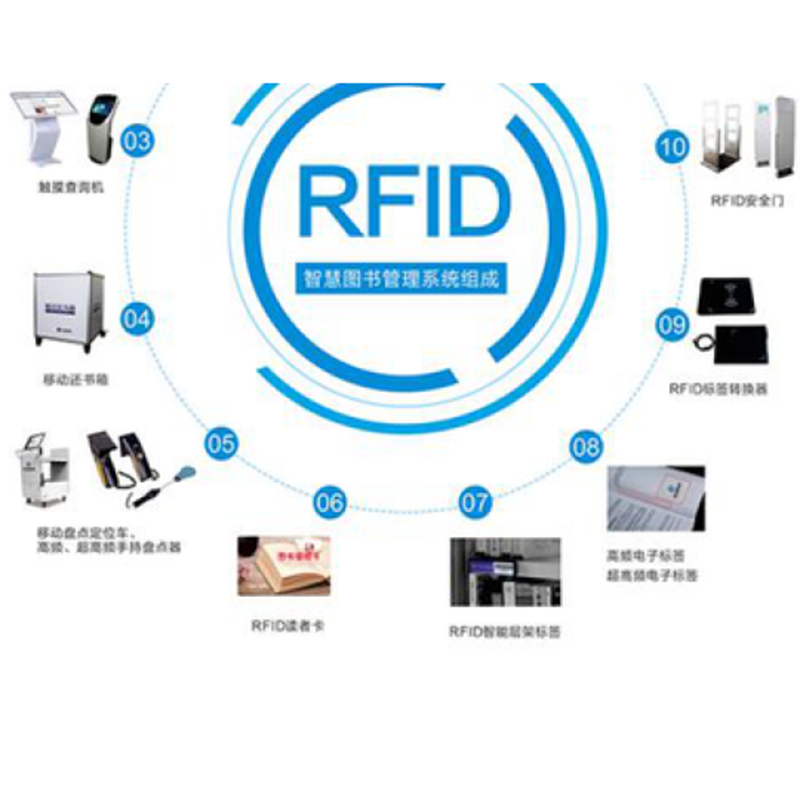RFID asset management system, inventory of the four major application scenarios of RFID in the retail industry
In this article, Donglai Electronics editor will take a look at the four major application scenarios of RFID in the retail industry! With the rapid development of the Internet of Things industry, RFID technology has been applied in our daily lives, bringing convenience and speed to people’s lives. RFID tags use wireless radio frequency technology (RF) to identify the identity and information of items.
The retail industry is interconnected throughout the entire supply chain, from procurement, storage, packaging, loading and unloading, transportation, distribution, sales to services. Enterprises must have real-time and accurate control over the flow and changes of the entire commercial, logistics, information, and capital flows, while RFID effectively provides input/output of business operation data, control and tracking of business processes, and reduces error rates for the retail industry. Therefore, RFID technology has a considerable appeal to the retail industry that focuses on logistics and inventory management, and retail giants have also poured great enthusiasm into it.

RFID asset management system, inventory of the four major application scenarios of RFID in the retail industry
1、 Supply Chain Management Based on RFID in Supermarket Stores
In recent years, the rapid development of RFID technology has brought leapfrog development opportunities for supply chain management in the retail industry. As Wal Mart, Marks&Spencer, Metro AG, Albertson, Target and other international retail giants have successively released the mandatory use of RFID supply chain management technology, the confrontation between finished product supply chains has become the key to success or failure of future retail industry competition.
RFID asset management system, inventory of the four major application scenarios of RFID in the retail industry
2、 RFID based inventory management for footwear and clothing retail enterprises
With the increasing penetration rate of RFID electronic tags in the retail industry, clothing is gradually introducing RFID technology into the entire management system. It is expected that the penetration rate will increase rapidly in the coming years. According to data, by the end of 2016, the global chain retail industry, mainly focused on clothing, had a demand for over 5 billion RFID tags. Such as Decathlon, ZARA, Uniqlo abroad, Hailan Home, La Chapelle, UR, etc. in China have fully implemented RFID projects.
The high application of RFID electronic tags in the clothing industry is due to two main reasons: firstly, the tags in this scenario belong to consumables. Once the electronic tags reach the final stage, which is in the hands of consumers, the mission of the electronic tags is immediately completed; Another reason is that due to its increasingly low manufacturing costs, the average cost of a single electronic tag in this application scenario in China is less than 1 yuan, which is generally less than 1% of the selling price of a piece of clothing.
RFID asset management system, inventory of the four major application scenarios of RFID in the retail industry
3、 RFID application in unmanned convenience stores
There are numerous unmanned convenience stores, but RFID technology is essential. Each item is labeled with an RFID tag for checkout and payment purposes. In addition, it is equipped with monitoring systems, remote customer service, and other functions.
4、 The Application of RFID in Supply Chain Logistics
By using RFID technology, the transparency of supply chain logistics management and inventory turnover can be improved, effectively reducing out of stock losses and improving logistics efficiency within the enterprise.
One fast: fast logistics efficiency, fast number of goods handover points, improving logistics operation efficiency;
Second accuracy: accurate data collection, accurate collection of goods circulation data in various stages of logistics management.
RFID asset management system, inventory of the four major application scenarios of RFID in the retail industry
Based on the current status of warehouse management and the feasibility study of RFID technology in logistics management, embedding advanced RFID data collection methods in the WMS system can achieve the management of RFID labeled storage locations and pallets. In this way, it can not only achieve the informatization and modernization of enterprise logistics management, but also improve the level and efficiency of enterprise logistics management, and reduce enterprise management costs.
The four major application scenarios of RFID in the retail industry mainly share the above content. From the perspective of the future development trends of logistics at home and abroad, the construction of network informatization is the trend of the future development of warehousing logistics. The new technology represented by Radio Frequency Identification (RFID) is profoundly influencing warehouse management and warehouse management systems, and even giving birth to a “logistics revolution”.






